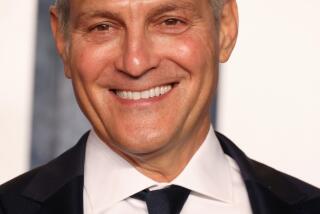L.A. Unit the Point Man for Dentsu : Office Here Tracks U.S. Fads It Thinks Will Play in Tokyo
It hooked up Michael Jackson with Japan’s giant phone company, National Telegraph & Telephone. It matched Madonna with Mitsubishi Home Electronics. And it pegged Paul Newman as a pitch man for Fuji Card, a Japanese credit card.
If you don’t remember any of these commercials, that’s because you probably haven’t seen them. The spots air almost exclusively in Japan. But behind these ads is the tiny Los Angeles division of Dentsu, the world’s largest advertising agency group, with $6.8 billion in billings.
Yes, of course, Dentsu owns a huge advertising agency in the United States called HDM. But separately, and for years almost anonymously, Dentsu has maintained a separate Los Angeles research unit. Its main mission is to determine who or what in America is hot--and who or what is not.
After all, the agency figures, fads that catch on in the United States are a strong bet to eventually catch on in Japan.
One way to do that, of course, is to understand Hollywood. With that in mind, several employees spend most of their time simply scanning through an estimated 200 American magazines--especially entertainment industry magazines--from Billboard to Premiere.
“We’re not an ad agency,” said Takashi Nakamura, president of Dentsu Inc. of Los Angeles. “Our function is to export American expertise to Japan. We create concepts and we promote ideas.” More than anything else, however, Dentsu’s Los Angeles office--which employs just 30 people, compared to the more than 5,000 employed in its Tokyo office--is the U.S. eyes and ears for its parent company. It researches everything from America’s newest trends to its hottest celebrities. It then lobbies its senior executives in Tokyo to match America’s fast-rising fads with major Japanese corporate clients.
“We throw the ball,” Nakamura said, “and they catch it.”
Sometimes, however, that can require plenty of tosses. Indeed, the ad firm’s top executives in Tokyo often demand mounds of documentation before they will buy into an American trend, Nakamura said. “I look for lots of articles to support my ideas.”
More than a year ago, for example, the Los Angeles office tried to persuade executives in Tokyo to sign up a big corporate client with the fast-rising American singer Tiffany. At the time, however, Tiffany had recorded only one hit song. “That wasn’t enough,” said Hal Lifson, the agency’s Los Angeles creative director. “They said that she had to become a star.”
Since then, however, Tiffany has had several hits, and she recently signed to star in a Japanese ad for Yamaha’s electronics division, a client of Dentsu.
Meanwhile, Lifson is trying to convince Dentsu executives in Japan that some of America’s comic book and cartoon heroes--including Batman, Archie and Gumby--could be popular corporate symbols for some of Dentsu’s Japanese clients. “They love American pop culture in Japan,” he said. “And the Japanese have a much higher aesthetic appreciation for things like animation than we do. To them, it’s not kid stuff.”
Although Dentsu has had a Los Angeles office since 1961, for more than 20 years it was mostly a place where the ad firm’s Japanese clients went when they wanted a sightseeing tour of the Los Angeles area, Nakamura said. Indeed, the office had only one employee until 1984, when the Summer Olympics became a focus for advertisers worldwide. It was this office, for instance, that played a role in linking Fuji with a blimp for the Olympics.
Now the office is becoming more aggressive in helping its parent beckon U.S. firms that want to expand their corporate presence in Japan. It has, for instance, just printed a glossy brochure boasting of its numerous marketing efforts and stating that the company is avidly seeking clients that want “the fastest shortcut to Japan.”
Competitors, meanwhile, are watching with keen interest. “You can never underestimate Dentsu,” said Kent Cooper, director of public relations for the Los Angeles office of Hakuhodo Advertising, whose parent ranks as Japan’s second-largest ad firm. “The signals are all there that Dentsu may be changing its U.S. advertising strategy, and it may soon become a major player in the (Los Angeles) market.”
Daihatsu Account Changes Hands 3rd Time in Year
Daihatsu America on Monday parked its $15-million advertising account with the third Los Angeles ad agency to handle the business in the past year. The Los Alamitos-based Japanese auto maker said Kresser, Craig/D.I.K. had won it.
In a statement, Executive Vice President C. R. (Dick) Brown said Daihatsu was impressed with the agency’s “creative track record.” The ad firm--a division of the giant Omnicom Group--formerly helped launch Mazda in the United States.
Late last week, the ad firm Admarketing said it resigned the Daihatsu account after handling it for just six months, saying the auto maker was hard to work for. Before Admarketing, the account was held about a year by Abert, Newhoff & Burr. “Our entire agency,” said Bob Kresser, chairman and chief executive of Kresser Craig, “is committed to making Daihatsu a household word in the United States.”
Agency Proposes Fees Based on Success of Ads
Should advertisers pay for results? Right now, most businesses pay the same amount for advertising whether it succeeds or fails.
Advertising executives traditionally have said they should be paid a flat 15% of total billings. But in an ad scheduled to run in today’s New York Times, one New York agency suggests a sliding scale based on results.
“If the agency keeps your brand strong and helps it grow, pay them more. If they don’t, pay them less,” says the $5,000 ad run by Martin Marshall Jaccoma Mitchell, which creates ads for such companies as Ralston Purina and the Meridien hotel chain.
In an interview, John C. Martin Jr., president of Martin Marshall, said agencies should be willing to take 20% less than conventional fees. “But if I beat a predetermined benchmark,” he said, “the advertiser should be willing to give me twice the 20% that I gave up.”
Veteran Southland Adman Soon to Be Pitching Sails
Cochrane Chase’s boat is about to come in. Or perhaps, set sail.
The founder and chairman emeritus of the Irvine ad agency AC&R;/CCL (formerly Cochrane Chase, Livingston & Partners) will soon leave Newport Beach for Alaska--and points unknown. In March, the 56-year-old Chase and his wife are set to board their 38-foot boat and sail for months--or possibly even several years.
“I don’t want to put a time frame on it,” said Chase, who founded the agency 22 years ago. “When you’re out sailing on your own, you’re not just the navigator but also the plumber and the electrician. You learn a lot about yourself.” Chase is scheduled to leave the agency on Dec. 31, although he has retained a two-year consulting contract.
“After 22 years of getting beat up in this business, I’m ready to step down,” said the silver-haired Chase. “You know, I used to have dark brown hair.”
More to Read
Inside the business of entertainment
The Wide Shot brings you news, analysis and insights on everything from streaming wars to production — and what it all means for the future.
You may occasionally receive promotional content from the Los Angeles Times.










